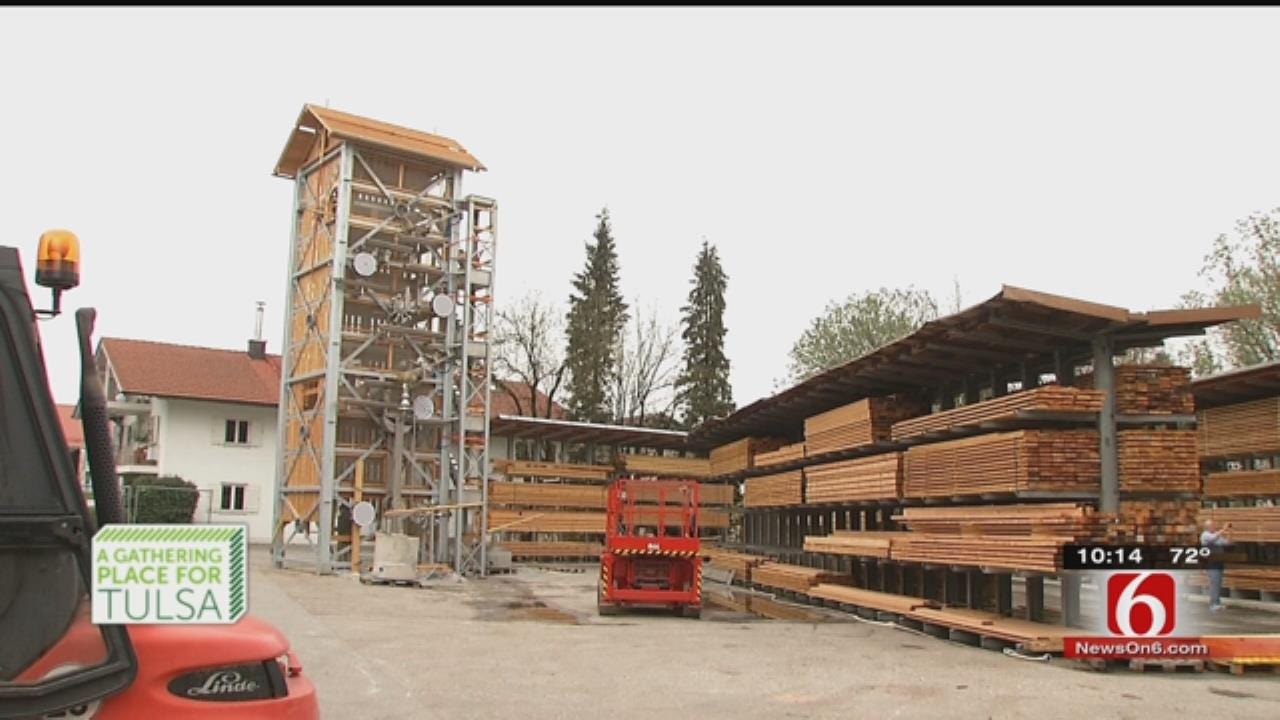'Why Germany?' Tulsans Wonder Why Gathering Place Playground Was Built In Europe
<p>Why are the children's playgrounds for Tulsa's privately-financed Gathering Place being built in Europe? A question many Tulsans have asked since learning a German woodshop was building the equipment.</p>Thursday, June 2nd 2016, 11:26 pm
Why are the children's playgrounds for Tulsa's privately-financed Gathering Place being built in Europe?
It’s a question many Tulsans have asked since learning a German woodshop was doing much of the work to build the massive playground equipment.
The answer is a sad commentary on our society, really. Americans aren't doing the work because we're too quick to sue one another.
When Erin Bellassai takes Althea and Elliot to the neighborhood playground, there are no unexpected surprises. American play equipment follows the same predictable form - built close to the ground, lots of plastic, not very challenging.
“Uh, well, yeah, for my kids, ages 1 and 5, it's good,” Bellassai said.
When they build playground equipment at Germany's Richter Company, they begin by harvesting larch trees in the Austrian Alps.
For more than 40 years, they've built with the belief that children should be challenged on playgrounds filled with natural products.
Play, in Germany, is a thought exercise.
Julian Richter Sr. with Richter Spielgerate said, “It never should destroy, it should build up, it should push, and help and support and not bring down and de-motivating. The de-motivation is big enough in the rest of the world, de-motivation is around us.”
The European outlook on play is a big reason Tulsa's Gathering Place playgrounds are being built there.
“So it's important to have safe equipment, but we want kids and adults to be challenged. We want them to have fun, we want their imaginations to be sparked, we want them to think differently about outdoor play,” said Gathering Place executive director, Jeff Stava.
And there's another reason - the unspoken secret of American playground building. No American company is building the kind of equipment designers wanted for Tulsa.
Stava said, “There is no factory and no outdoor play experts that do natural outdoor play that have puzzles, and games and teases within - built into the equipment in the United States. There's just not that capability and that expertise.”
Because American play equipment makers have been spooked by the fear of litigation - too afraid that if your child breaks a finger or skins a knee, you'll file a lawsuit - so it's not worth it to them to build anything but the most generic playgrounds.
“We have dumbed them down so much that we have an attitude that no child should ever be hurt in a playground environment,” Gathering Place playground safety consultant, Teri Hendy said.
Hendy travels the world consulting on playground safety. She's in Germany making sure Tulsa's equipment meets every U.S. standard - and there are thousands of federal playground standards.
So many standards, she said, that if they were applied to soccer, basketball or football, roller blades, skateboards or bicycles, no American child would ever leave the house.
“Because, for whatever reason, society has accepted riding a bike is part of childhood, and you fall off a bike you might get hurt, but boy, if you fall off a playground structure and you break your arm, then somebody's gonna be sued, and it has to be somebody's fault. And there's really something wrong with that,” Hendy said.
In Germany, if your child's injured on a playground, you can't sue - the law says you're responsible.
If we didn't sue each other so often, Americans might have built this equipment, but we do, so we're not.
The state of American play is something to consider when you and the kids are climbing the German towers.
“Play has become a four-letter word,” Hendy said.
More Like This
September 29th, 2024
September 17th, 2024
Top Headlines
December 15th, 2024
December 15th, 2024
December 15th, 2024
December 15th, 2024












